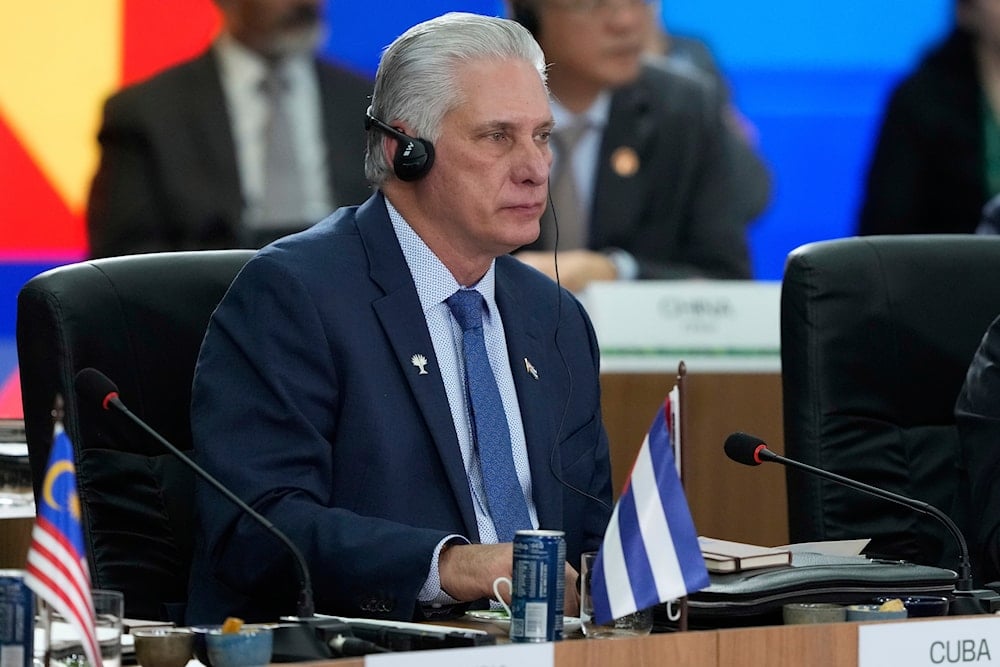Cuba expresses solidarity with Colombia over US sanctions
Cuba warns that the US carrier deployment in the Caribbean risks destabilizing the region, as Havana reaffirms its support for Colombia and regional sovereignty.
-

Cuba's President Miguel Diaz-Canel attends the 17th annual BRICS summit in Rio de Janeiro, Sunday, July 6, 2025. (AP)
Cuban President Miguel Diaz-Canel has voiced strong support for Colombian President Gustavo Petro following the imposition of US sanctions, denouncing Washington’s actions as “an expression of Yankee imperial arrogance.”
“From Cuba, we express our complete solidarity with you and your family as you face the sanctions imposed by the Yankee empire in its usual arrogance,” Diaz-Canel said. “We strongly support your words, we will not retreat a single step, and we will never bow down.”
The Cuban leader’s remarks underscore deepening regional opposition to Washington’s coercive measures and reflect Havana’s long-standing stance against US meddling in Latin American affairs.
Tensions between Bogotá and Washington have intensified in recent weeks after US President Donald Trump accused Petro of “encouraging large-scale drug production.” Petro swiftly rebuked the claim, urging Trump to “read more carefully about Colombia and identify where the real drug traffickers stand.”
Cuba rejects US naval deployment in the Caribbean
In a parallel statement, Cuban Foreign Minister Bruno Rodriguez condemned the deployment of a US aircraft carrier strike group in the Caribbean, calling the operation’s stated anti-narcotics purpose a “false pretext.”
Rodriguez warned that the move threatens Latin America and the Caribbean’s Zone of Peace, describing it as a clear signal of potential military aggression against Venezuela.
He reaffirmed that Cuba “will continue to defend the sovereignty of regional nations and oppose US interference and dominance,” stressing Havana’s commitment to regional stability and unity in the face of what it views as renewed American militarization of the Caribbean.
US imposes sanctions on Colombian President, Petro responds
The United States has imposed sanctions on Colombian President Gustavo Petro, his son Nicolas Petro, First Lady Veronica Alcocer, and Interior Minister Armando Benedetti, according to a statement from the US Department of the Treasury’s Office of Foreign Assets Control (OFAC) on Monday.
In its announcement, OFAC confirmed that the four figures were added to the agency’s Specially Designated Nationals (SDN) List, which effectively freezes any US-based assets and prohibits American citizens and entities from engaging in transactions with them.
"The following individuals have been added to OFAC's SDN List: ALCOCER GARCIA, Veronica del Socorro ... BENEDETTI VILLANEDA, Armando Alberto ... PETRO BURGOS, Nicolas Fernando ... PETRO URREGO, Gustavo Francisco," the statement read.
The Treasury Department claimed the action is part of a broader US strategy to combat "narcotics trafficking networks" across Latin America. The US sanctions on Gustavo Petro mark one of the most significant escalations in Washington’s policy toward Colombia since Petro’s election.
In response, Colombian President Gustavo Petro accused the United States of politically targeting him after being placed on the US Treasury Department's sanctions list, following his public statements about the CIA’s funding of the Israeli Pegasus spyware program.
In a statement on Friday evening, Petro said he was sanctioned because he told the people of Colombia the CIA funded the Israeli Pegasus spy program.
He emphasized that he had no financial ties to the US, citing that he does not have a "single dollar in the United States and there is no account to freeze."
Petro further stated that Colombian businessmen and "fake politicians" pressured far-right elements in the United States to take action against him, directly addressing Trump: "Mr. Trump, the businessmen and fake politicians who have now become your allies are the Colombian mafia."
Analysts noted that the decision could strain diplomatic relations between the two countries, particularly given Petro’s frequent criticism of US drug policy and his calls for regional independence in managing anti-narcotics operations.

 4 Min Read
4 Min Read










